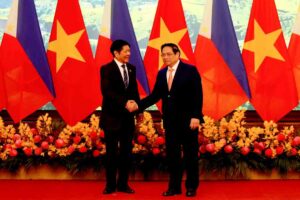THE PHILIPPINES and Vietnam sealed several deals on Tuesday including one that will ensure steady supply of Vietnamese rice to its Southeast Asian neighbor, where prices of the food staple have spiraled in recent months.
At the same time, Manila expressed commitment to boost its trade with Hanoi by at least $3 billion.
Under a memorandum of understanding (MoU) signed during President Ferdinand R. Marcos, Jr.’s two-day state visit to Vietnam, Hanoi committed to supply 1.5 million to 2 million metric tons of white rice to the Philippines “at a competitive and affordable price” for five years, Malacañang said in a statement.
The deal was signed by Philippine Agriculture Secretary Francisco Tiu Laurel, Jr. and his Vietnamese counterpart.
“The MoU on Rice Trade Cooperation creates a framework for rice cooperation between the Philippines and Vietnam to ensure and establish sustainable food supply amidst the impact of climate change, pandemics, and other events external to both countries,” the Palace said.
The Philippines and Vietnam also signed a MoU on agriculture cooperation, which will intensify their ties “in the fields of agriculture, rural development, and other related fields” and facilitate over a dozen areas of cooperation in-cluding on high-value crops, livestock, and aquaculture, farm management and sustainability, smart agriculture and aquaculture technology, it added.
The deal would also facilitate training and exchange of agriculture experts.
Mr. Marcos and Vietnamese Prime Minister Pham Minh Chinh first discussed the rice deal during their bilateral meeting on the sidelines of the 43rd Association of Southeast Asian Nations (ASEAN) Summit in Jakarta, Indonesia in September last year.
“I appreciate Vietnam’s readiness to support the Philippines’ rice requirements. Especially coming from the pandemic, we recognize the importance of food security and sustainable global supply chains,” Mr. Marcos told Mr. Pham at their bilateral meeting on Tuesday.
He said the two countries should find more opportunities in their trade, especially under the Regional Comprehensive Economic Partnership (RCEP) which is touted as the world’s largest free-trade agreement.
“The Philippines is committed to enhancing and fortifying our economic, trade, and investment ties with Vietnam,” he said, noting that his country seeks to expand its bilateral trade with Vietnam, which stands at just about $7 billion today, to $10 billion “by exploring untapped resources.”
“And in time hopefully the balance between our imports and exports will move to a more equitable ratio,” he added.
Vietnam is the Philippines’ 11th largest trade partner, and the 5th largest trade partner among its Southeast Asian neighbors.
“We hope to capitalize on our countries’ ratification of the RCEP to maintain the upward trend in our trade,” Mr. Marcos said.
He said the Philippines is committed to forge a “close partnership” with Vietnam by streamlining trade and investment procedures and cultivating “a transparent and predictable business environment that promotes fair compe-tition and mutual growth and development.”
Mr. Marcos also said the country is “eager” to work with Vietnam on projects focused on mitigating land-based and marine pollution.
“Furthermore, I am excited about the prospects of pursuing low carbon growth and engaging in joint research initiatives,” he added.
Mr. Marcos sought the support of Vietnam in its bid to host the Board of the United Nations’ Lost and Damage Fund, which was adopted by world leaders during the COP28 last year.
“I’m hopeful that we can engage in the exploration of business opportunities, and exchange of technology, enhancement of capacity, and collaboration on projects related to biomass and waste-to-energy, geothermal energy, and the offshore wind industry, amongst other areas,” he added.
Mr. Marcos said his country also hopes that Vietnam will be an important partner in its shift to electric vehicles. — Kyle Aristophere T. Atienza
